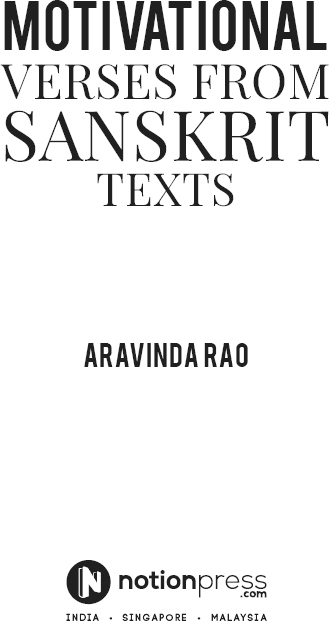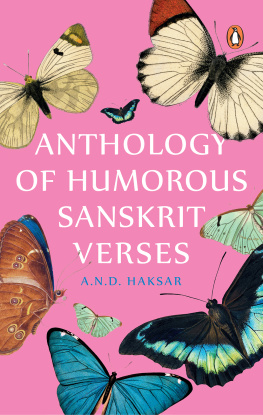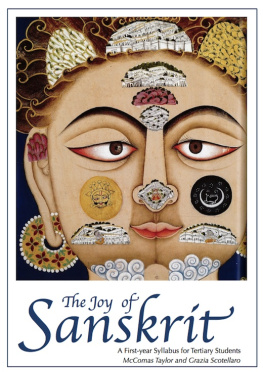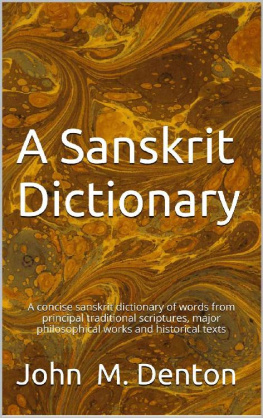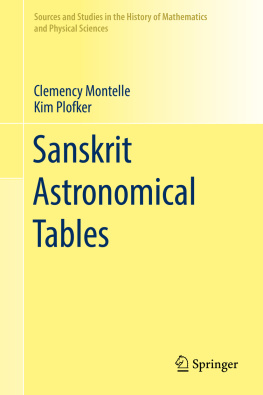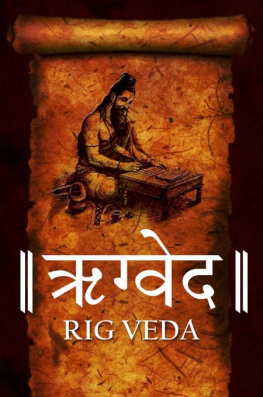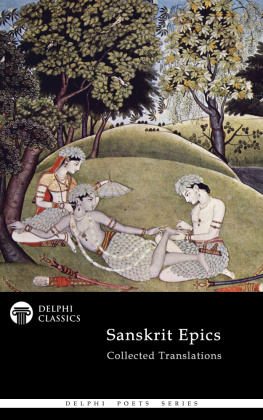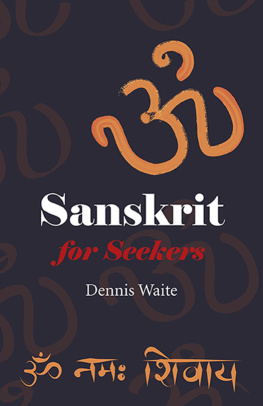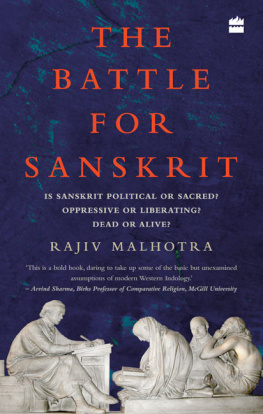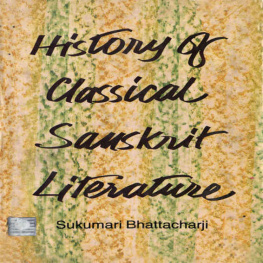Notion Press
Old No. 38, New No. 6
McNichols Road, Chetpet
Chennai - 600 031
First Published by Notion Press 2018
Copyright Aravinda Rao 2018
All Rights Reserved.
eISBN 978-1-64429-841-1
This book has been published with all efforts taken to make the material error-free after the consent of the author. However, the author and the publisher do not assume and hereby disclaim any liability to any party for any loss, damage, or disruption caused by errors or omissions, whether such errors or omissions result from negligence, accident, or any other cause.
No part of this book may be used, reproduced in any manner whatsoever without written permission from the author, except in the case of brief quotations embodied in critical articles and reviews.
Dedicated to
Sri Hari Kiran Vadlamani
A karma yogi ,
A visionary motivating many
CONTENTS
ABBREVIATIONS USED
CN Chankya Niti
MB Mahbhrata
MS Manu Smriti
THE TRADITION OF MOTIVATIONAL VERSES
Here we have a collection of a little over hundred verses, most of which were a part of the common mans knowledge not long ago. We grew up learning such verses, though by rote, without much understanding of their importance. There are some verses that teach ethical behaviour and some others which realistically and bluntly speak about human behaviour in different situations. The verses told in the context of kings are relevant to us too, as they relate to social relations.
We see that most of the present day societies are focusing more on imparting job-oriented skills to children, paying little attention to their emotional growth. The governments too are cutting back on the liberal arts which are essential for the emotional intelligence and maturity of our children. Its negative manifestations are sadly realised at a later stage in life. We realise that progress cannot be at the cost of higher values and goals in life.
Sanskrit literature abounds in motivational verses for all occasions. The ancient epic Mahbhrata is probably the fountain head of such verses. The epic has hundreds of sub-plots or episodes narrated by one character to another. In many such narrations there are stories of great men, stories of common folk, stories in which birds and animals are the characters. The last portions of the epic are particularly rich with such stories of birds and animals. These portions are perhaps the models for the later day works.
Two highly popular later day works are Pacatantra and Hitopadea . Originally, Pacatantra was said to be the work of a Jain scholar of 1 st century AD but the book which is available in the present form is authored by Vishnu Sharma of a later date. The other work Hitopadea is by Narayana Pandita and the structure of the book is almost the same as Pacatantra . A king has four dull-witted sons who have come of age but have not learnt any statecraft. The traditional teachers somehow fail in their case and the king is in search of some brilliant teacher who would educate them. A scholar named Vishnu Sharma takes the challenge and volunteers to teach them in his own unconventional way. He then narrates several stories in which the characters are animals and birds. The stories are interspersed with several wise sayings from the ancient texts.
The syllabus for the princes in those days included four subjects. The first were the four Vedas , in order to inculcate ethical behaviour. Logic was next. It was to enable a person to evaluate and know the validity of arguments and discern truth. The third was commerce for economic well-being of the state and finally jurisprudence in order to rule the subjects judiciously. The teachers task was heavy but he was well versed in the knowledge of epics. He has built stories around diverse themes such as how to make friends, how to create dissentions in the enemy camp, how to have presence of mind and face a challenging situation. The characters talk among themselves. The lion, naturally, is the king chosen and the wily foxes are its ministers. It is through the mouth of these foxes that the teacher conveys the statecraft told in the mighty verses of Mahbhrata . Most of the verses quoted by these foxes and other characters are from the Mahbhrata .
Another well-known name is Bhartrihari, the philosopher-king of the 5 th century AD. He wrote a trilogy, each having hundred verses, addressed to the student, the youth and the seeker. Other major works are the ukranti and Kautilyas Arthastra . There are thousands of verses in all these books and if we see the anthology of such verses, the number will be running into several hundreds.
These verses are like the box of truisms and words to live by, in Louis Mac Neices words. They may not be fully understood by the kids right now, but they reveal their full flavour as the kids grow and face the realities and problems of life. They are like the time release capsules which release themselves slowly.
I have given a word to word translation of the verses in order to help the Sanskrit students. The IAST (International Alphabet for Sanskrit Transliteration) code has been used in the text.
MOTIVATIONAL VERSES FROM SANSKRIT TEXTS
KNOWLEDGE IS ENDLESS CHOOSE WISELY
anantastra bahu veditavya
alpaca klo bahavaca vighn
yat srabhta tad-upsitavya
ha so yath k ram-iv bumiram
ananta-stra The scriptural knowledge is endless; bahu veditavya there is a lot to be known; alpaca klo time is limited; bahavaca vighn the obstacles are many; yat srabhta whatever is the essence; tad-upsitavya that has to be followed; ha so yath just like a swan; k ram-iva in the case of milk; a bu-miram mixed with water.
Knowledge is endless and there is much to know. Time (lifetime) is limited and the obstacles are many. One has to choose that, which is the essence, just like a swan that picks up only milk from the diluted milk.
The legendary swan is said to separate and suck only the milk from a mixture of milk and water. It takes what is important and leaves the rest. A wise student does the same.
With the advent of technology there is an exponential growth of human knowledge. Every day sees the emergence of a new branch of knowledge. Even the learned people fall into two categories the specialists and the generalists. The specialists are said to know more and more about less and less as Will Durant put it and the generalist is said to know less and less about more and more. One can choose to be a generalist or a specialist.
Sometimes, as parents, we are rather anxious that our kids have to be masters in everything. We push ourselves in the same way but soon we realise that we have to make a choice. Francis Bacon said some books have to be seen, some have to be read and some have to be chewed and digested. We have to decide which one we have to chew and digest.
The above verse is echoed by Tennyson who said:
Yet all experience is an arch wherethro Gleams that untravelld world whose margin fades Forever and forever when I move.
Ulysses
The horizons of knowledge are endless and there is too much information to be known. One has to take the essence only, leaving a lot of other stuff.
The image of swan in the above poem has some special connotations in the Indian tradition. The word ha sa (swan) refers to a wise person and a related word parama ha sa refers to a saint who has withdrawn from the world.

